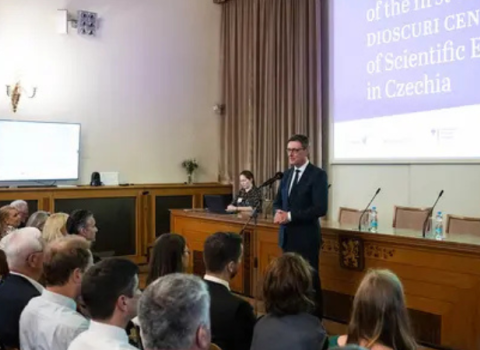The government says the increase is the largest since 2017, as it lays plans for artificial intelligence and space technologies research

Marek Ženíšek, minister for science and research of Czech Republic. Photo credits: Marek Ženíšek / Twitter
Czechia’s budget for science and research will go up by nearly 8% next year, to €1.72 billion, the government has announced.
This will provide extra support for Czech scientists, new funding for their projects and for increased international collaboration.
According to the budget proposal, more money will go to excellent early-career scientists and to new calls for proposals in strategic fields such as artificial intelligence, chips and quantum.
Marek Ženíšek, minister for science and research, said this is the largest increase in public expenditure since 2017. In 2022, the research budget was €1.55 billion, while in both 2023 and 2024, it was around €1.6 billion.
“After years of stagnation, more money should go to science and research, among other things, to support young excellent scientists and, through institutional support, to people in science and research organisations in general," said Ženíšek.
As a result, Czechia’s main grant agency will be able to increase funding for its Junior Star grants for early career scientists. The new funding streams for artificial intelligence, chips and quantum technologies will be managed by the Ministry of industry and trade through its TWIST programme, or through the Czech Technology Agency’s SIGMA programme. The government has also announced the launch of a new competence centre for chips will open next year.
"We have managed to fulfill the promise that scientists and innovators in the private sector will have access to more resources," said Ženíšek.
Getting closer
According to the World Bank, Czechia invested 2% of its GDP on research and development in 2021. The country is one of the few in central and eastern Europe getting closer to the EU average of 2.2%. Estonia, Hungary and Poland are next in line with 1.7%, 1.5% and 1.4% respectively. In Czechia, 60% of the total R&D expenditure comes from the private sector, while the rest comes from the national budget and international funding programmes such as Horizon Europe.
The European Commission has been trying to convince member states to spend at least 3% of their GDP on R&D for more than two decades now, but progress has been very slow, with only a handful of countries reaching that target. In his recent report on EU competitiveness, former Italian prime minister Mario Draghi said the EU should reafirm its committment to that target, “within a defined timeframe”.
In addition to the budget increase, the Czech government recently updated its national strategy for artificial intelligence, has drafted a national semiconductor strategy and is planning a new development strategy for Czechia’s Technology Agency.
“The main objective of the National Semiconductor Strategy, which follows the European Chips Act, is to triple the size of the semiconductor sector in the Czech Republic,” Ženíšek told a meeting of the Research, Development and Innovation Council in June this year.
This article was written with the help of www.vedavyzkum.cz, a Czech science policy news site.





 A unique international forum for public research organisations and companies to connect their external engagement with strategic interests around their R&D system.
A unique international forum for public research organisations and companies to connect their external engagement with strategic interests around their R&D system.